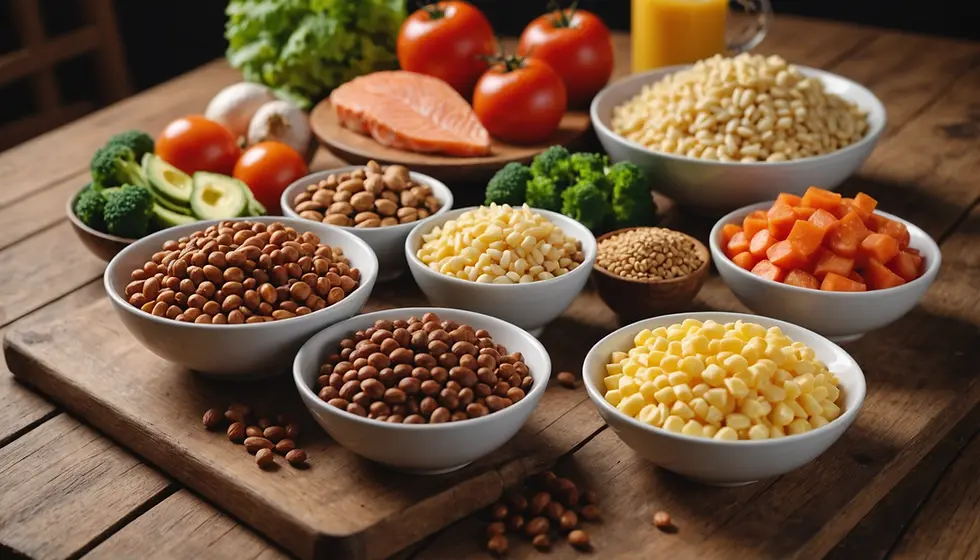How to Optimize Performance: Balancing Nutrition and Exercise for Peak Results
- Leonard Baker
- Jan 31
- 4 min read
In the quest for high performance, the connection between nutrition and exercise is essential. Whether you are an athlete aiming for personal records or simply seeking to improve your daily well-being, the right balance can unlock your potential and lead to impressive results. Let’s break down this partnership and show you how to make it work for you.
The Importance of Nutrition in Performance
Nutrition goes beyond calorie counting or following popular diets. It is about providing your body with quality nutrients that enhance performance. Proper nutrition fuels workouts, supports recovery, and boosts overall health.
During physical activities, your body uses glycogen and fat for energy, while protein aids in muscle repair. Research indicates that individuals who maintain a well-balanced diet see marked improvements in their performance metrics. For example, athletes who prioritize carbohydrate intake can enhance their endurance by 20 percent compared to those with inadequate carb consumption.
A solid understanding of macronutrients—carbohydrates, proteins, and fats—is crucial. Carbs provide energy, proteins help build and repair muscles, and fats support cellular functions. Knowing when and what to eat is vital for anyone looking to achieve optimal performance.
Timing Your Meals: Pre-, During, and Post-Workout
Nutrition is also about timing. The right meals consumed at the right times can greatly influence your performance.
Pre-Workout Nutrition
Consuming a meal rich in carbohydrates 1-3 hours before exercising can set you up for success. Options such as oatmeal with banana or whole-grain toast with peanut butter offer quick energy sources. Including a small portion of protein helps with muscle support. For instance, a yogurt parfait topped with berries is both energizing and satisfying.
During Workout Nutrition
If your workout lasts longer than an hour, consider replenishing your energy during the exercise. Options like sports drinks or energy gels can provide carbohydrates and electrolytes. Studies show that consuming 30 to 60 grams of carbs per hour during prolonged exercises can sustain performance and delay fatigue.
Post-Workout Nutrition
Recovery is critical after working out. Aim to eat a balanced mix of protein and carbohydrates within 30 to 60 minutes after your session. A protein shake with a banana, or grilled chicken with sweet potatoes, can help restore your energy and repair muscles effectively. Research suggests that nutrient timing can enhance recovery by as much as 25 percent.

Hydration: A Key Component
Hydration is just as essential as nutrition. Water is vital for temperature control, joint lubrication, and transporting nutrients.
Even slight dehydration can impair performance. Studies show that losing just 2 percent of body weight from dehydration can lead to reduced strength and endurance. Therefore, staying hydrated throughout the day and particularly around workouts is crucial. Aim for half your body weight in ounces of water daily, and consider electrolyte-rich drinks for extended or intense workouts.
The Role of Supplements
While a balanced diet often provides adequate nutrition, some may look to supplements to enhance their performance. Popular options include protein powders, branched-chain amino acids (BCAAs), and omega-3 fatty acids.
However, it’s vital to research supplements thoroughly, as their effectiveness can vary. Consulting a healthcare professional or a registered dietitian ensures you’re making the right choices tailored to your individual needs.
Balancing Exercise Regimen and Nutrition
To achieve the highest performance, it's essential to integrate nutrition and exercise. Your workout plan should complement what you eat.
Types of Exercise
Different exercises require different nutritional support. For example:
Endurance Training: Focus on carbohydrates to sustain prolonged efforts. A study shows that athletes can improve performance by 15 percent by increasing carbohydrate intake during training.
Strength Training: Emphasize protein for muscle recovery and growth. Consuming protein post-workout can enhance muscle synthesis rates by up to 30 percent.
High-Intensity Interval Training (HIIT): A balanced intake of carbs and protein is ideal for success and recovery.
Consistency is Key
Consistency in both nutrition and exercise leads to long-term success. Create a structured weekly plan that includes dedicated workout sessions and meal prep. Aligning your meals with your workout schedule ensures your body gets the fuel it needs when it needs it.
Tracking your progress through journals or fitness apps can offer valuable insights into which strategies resonate with your lifestyle and help you way towards your goals.
Listening to Your Body
Everyone is different, and what works for one person might not be effective for another. Pay attention to how your body reacts to different foods and exercise routines.
Maintaining an open line of communication with health professionals can provide personalized advice. Adjusting your strategies based on energy levels, recovery times, and personal objectives is essential for reaching your goals.
A Pathway to Peak Performance
The combination of smart nutrition and exercise lies at the heart of optimal performance. By understanding the significance of quality fuel, meal timing, proper hydration, and personal needs, anyone can move closer to their peak potential.
Finding the right balance can take time, but even small steps toward better nutrition and exercise will deliver significant benefits over time. Embrace the process with determination, and peak performance can be a reality in your journey to better health and fitness.




Comments